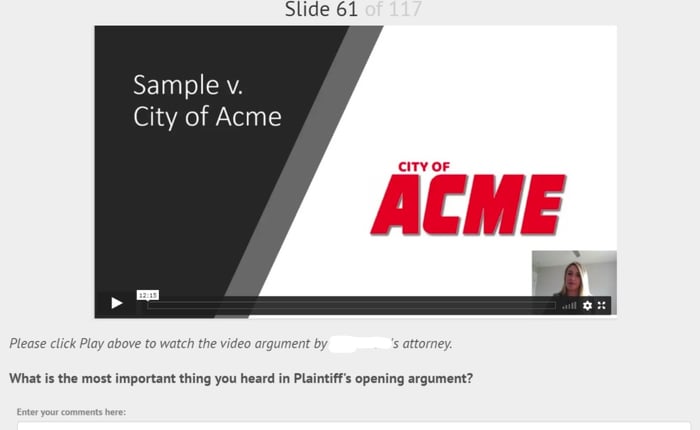This jury research was in conducted in September 2020 using JuryReactions. The defense used the research to evaluate risk, prepare for jury selection, and test trial themes. The online format saved time and money compared to in-person jury research, and was easier to conduct within COVID-19 restrictions.
Case summary
First Court conducted JuryReactions online jury research in a Minnesota employment retaliation case to help the defense prepare for trial. The case was scheduled for trial within several months and efforts to mediate had not been successful.
The Research Questions
- What defense themes resonated with local jurors?
- How did surrogate jurors react to the plaintiff’s video deposition testimony?
- How did jurors evaluate bad facts for the employer on the timing of the employment actions?
- Did jurors believe there were any significant economic or non-economic damages to the plaintiff?
- For jury selection, what juror backgrounds and attitudes were most correlated with supporting the plaintiff or the defense?
The Online Jury Research
Over several weeks, First Court worked with our attorney client's office to prepare materials to be presented to the jurors online. Defense attorney Jana Sullivan and her colleague recorded a 20-minute “clopening” argument for each side (from their homes/office). They also provided First Court with video clips from plaintiff’s deposition, summaries of key witness testimony, timelines, and abbreviated jury instructions & verdict form.

First Court then organized these materials into a 83-slide online case presentation on our secure website. Feedback questions were posed for jurors to answer throughout this case presentation—improving engagement and getting reactions while discrete pieces of evidence were fresh in their minds.
We then hired a representative sampling of 25 local jurors and allowed counsel to approve the group of selected jurors. These 25 jurors were given a 24-hour window in which to go through the online case presentation and provide written and video feedback on the materials presented.
Specifically, the average juror took about 3 hours to complete the online trial. They answered 48 questions about their backgrounds and pre-existing attitudes related to the case. Then, they answered 46 questions about the evidence and arguments presented in the case—including individual responses to the verdict questions. They also recorded brief video responses to two of the questions, allowing us to see each online juror explain their final decision in the case in their own words on their webcams.
The Group Deliberation
The day after the jurors completed the self-paced online trial, First Court hired eight of the jurors to attend a two-hour group deliberation on a secure Zoom video conference. These eight jurors were selected based on having different opinions about the case in their online feedback to generate healthy debate.

The jurors were given the jury instructions and verdict form by the First Court moderator via video conference and were asked to discuss and come to a unanimous agreement about how to decide the case. The moderator asked some follow-up discussion questions with the remaining time after they finished with the group verdict form.
The Takeaways
The online jury research took about 20 hours in all for the defense attorney to prepare for and attend. She received a ~200-page data report with all of the surrogate jurors’ written and video feedback, as well as the video recording of the group deliberation. She also received First Court’s ~20-page analysis and summary of what was learned with the research.
Defense counsel Jana Sullivan tells us that this online mock trial provided her with valuable insights into her questions about how a jury would react to the case. "My team is now much better prepared for trial in this case: knowing instead of guessing our likely strengths and weaknesses with a jury."
Tags:
case study, Jury Research, Focus Group, innovation, jury selection, online jury research, workplace, employmentOct 28, 2020 4:17:04 PM


Comments